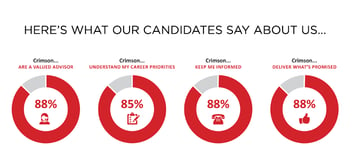9 reasons why virtual interviews will reduce your time-to-hire
According to CV-Library, the average time-to-hire (advert to offer) an IT professional is around 41 days. In comparison, 27.5 days is the median across all industries, according to Glassdoor. The larger the company, the quicker the recruitment process, and if you use a recruitment agency like Crimson, you are more likely to reduce your time-to-hire and the average cost-to-hire.
CV-Library research also indicates that over 80 percent of recruitment professionals do not recommend application forms; instead, CV’s and quick apply buttons are favoured. Advertising in the right place and the strength of your advert will help you attract more candidates. Advertisements that fail to pinpoint salaries and convey the company culture will not attract as much attention.
Similarly, a lengthy hiring process will also deter candidates. CV-Library state that over 49 percent of candidates believe there should be no more than two stages in the hiring process. A recent poll by Crimson’s Senior Appointments Practice revealed that over 90 percent of applicants for a senior IT role would not expect any more than two to three interviews. CV-Library also found that 71 percent of candidates will turn down a job offer if they have a bad interview experience.
Introducing video screening into the hiring process can drastically improve the candidate's experience and reduce the time-to-hire. Crimson recommends using video after you have shortlisted candidates via their CV and before their face-to-face interview.
Here are nine reasons why virtual interviews will reduce your time-to-hire
- Scheduling: trying to find a time that works for applicants, stakeholders, and HR can be a nightmare. If you're aiming to interview multiple candidates, this can quickly add up and take time to organise. Virtual interviews cut out the small talk and travel time; therefore, they're more convenient.
- Passive candidates: booking time off work for a job interview can be difficult, especially for senior roles. Candidates are forced to lie about their whereabouts or construct a story about their day off, so they don’t have to reveal the truth. Video interviews only require an hour out of the diary and some privacy; therefore, they will attract more applicants, particularly those who are not actively looking but would leave for the right opportunity (passive candidates).
- Stress: In-person interviews can cause capable candidates to underperform. Using video to shortlist candidates creates an informal setting where you can still observe body language. There are fewer distractions for candidates; potential employees don’t have to worry about following directions, finding a parking space or nervously waiting in a room with other candidates.
- Money: Remote interviews can also save you and candidates money, for example, travel expenses.
- Reputation: Jobseekers browse sites such as Glassdoor to research an employer. The process candidates experience is often a direct reflection of how an employer approaches employee engagement, which is more important than ever before in a competitive market. For example, remote working is now a common benefit. Why wouldn’t you want candidates to enjoy your interview experience? They will be much more likely to accept your offer.
- Reflection: with Willo (the software that Crimson uses), you can record interviews and share them with stakeholders. Imagine being able to rewind time, pause, and reflect without squabbling over candidates.
- Consistency: You can also ask interviewees specific questions to answer and upload in their own time with specialist interview platforms such as Willo, Crimson’s official virtual interview partner.
- Inclusivity: Unconscious bias is common, especially with in-person interviews. Video interview tech like Willo lets you get to know a candidate without an interviewer accidentally asking leading questions or subconsciously favouring one candidate over another. You can use a question bank and pre-record candidates’ answers.
- Get ahead of the competition: There has been a huge spike in the number of organisations conducting virtual interviews since the peak of the pandemic. Don’t allow your competitors to secure the best candidates on the market; get in there first.
Whilst many of us use Microsoft Teams and Zoom, using specialist virtual interview technology such as Willo is more effective. Willo has multiple features such as video storage, branding tools, app integration, and AI capability that can help you assess candidates.
Here at Crimson, we’ve selected Willo virtual interview software to help us shortlist your candidates. Whether you want to get a feel for candidates in a five minute ‘about me clip’, or you’d like to watch your candidates answer some pre-set questions. You will feel more confident about your shortlist, and your candidates will feel more comfortable when it’s time for their face-to-face interview with you.
Making mistakes in the hiring process can be costly, stall projects and prevent business transformation. If you choose to do an IT recruitment campaign with Crimson, you can ask your consultant about using our virtual interview technology for your campaign.
If you would simply like some advice on video interviewing, give us a call, we’re happy to share our experiences with you. Just think, you could be receiving your first video profiles within hours, expand your talent pool today, meet people, not paper.
Register your interest in using video tech on your next IT recruitment campaign.
Crimson is an IT consultancy, an IT solutions provider, an IT recruitment agency, and a Microsoft Gold Partner operating across the UK.


